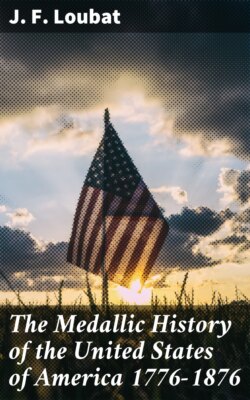Читать книгу The Medallic History of the United States of America 1776-1876 - J. F. Loubat - Страница 32
На сайте Литреса книга снята с продажи.
MAJOR HENRY LEE.
Оглавление[Surprise of Paulus Hook.]
HENRICO LEE LEGIONIS EQUIT. PRÆFECTO. COMITIA AMERICANA. (Henrico Lee legionis equitum præfecto Comitia Americana: The American Congress to Henry Lee, major of cavalry.) Bust of Major Lee, facing the right. On edge of bust, J. WRIGHT.
Within a crown of laurel: NON OBSTANTIB FLUMINIBUS VALLIS ASTUTIA & VIRTUTE BELLICA PARVA MANU HOSTES VICIT VICTOSQ. ARMIS HUMANITATE DEVINXIT. IN MEM PUGN AD PAULUS HOOK DIE XIX. AUG. 1779. (Non obstantibus fluminibus vallis astutia et virtute bellica parva manu hastes vicit victosque armis humanitate devinxit. In memoria pugni ad Paulus Hook, die 19 Augusti, 1779: Notwithstanding rivers and ramparts, he conquered, with a handful of men, the enemy by skill and valor, and attached by his humanity those vanquished by his arms. In commemoration of the battle of Paulus Hook, August 19, 1719.)[37]
The original die of the obverse of this medal is in the Mint at Philadelphia, but the original die of the reverse is not to be found there. A new one was engraved for the Mint, some time ago, by Mr. Wm. Barber.
Joseph Wright was born in Bordentown, New Jersey, in 1756. He studied painting in England and France, and, after his return to America, painted a portrait of General Washington. He was appointed first draughtsman and die sinker to the United States Mint, and made the dies of a medal, the bust on the obverse of which was considered to be the best medallic profile likeness of Washington. He also made the medal voted by Congress to Major Lee. He died in Philadelphia in 1793.
Henry Lee was born in Stratford, Westmoreland County, Virginia, January 29, 1756. He was graduated at Princeton College, New Jersey, in 1773; was appointed captain in 1777, and major in 1778. He surprised Paulus Hook, August 19, 1779, and received for the "prudence, address, and bravery" displayed by him on that occasion the thanks of Congress and a gold medal; he became lieutenant-colonel, November 6, 1780, and joined the southern army under General Greene, greatly distinguished himself in various engagements, and resigned in 1782. In 1786 he was chosen one of the delegates to Congress from Virginia; was governor of that State, 1791–1794; member of Congress, 1799; and on the death of Washington was selected to pronounce his eulogium, in which he embodied the memorable words: "First in war, first in peace, first in the hearts of his countrymen." He wrote, in 1809, "Memoirs of the War in the Southern Department of the United States." He died on Cumberland Island, Georgia, March 25, 1818. He was known during the Revolutionary War by the sobriquet of "Light Horse Harry."
